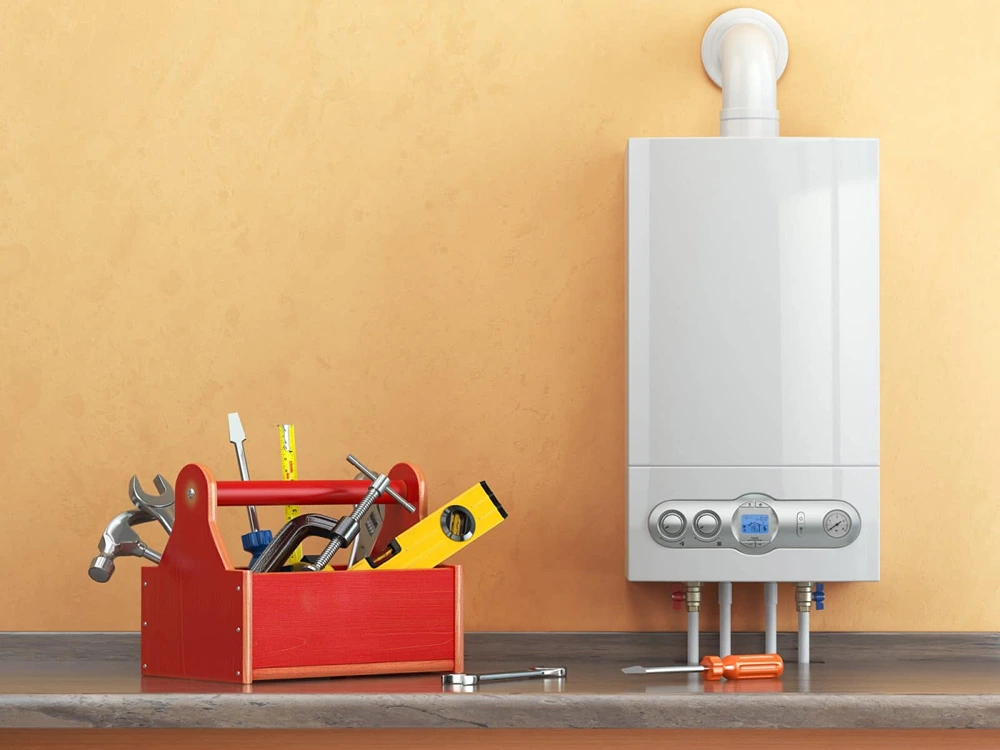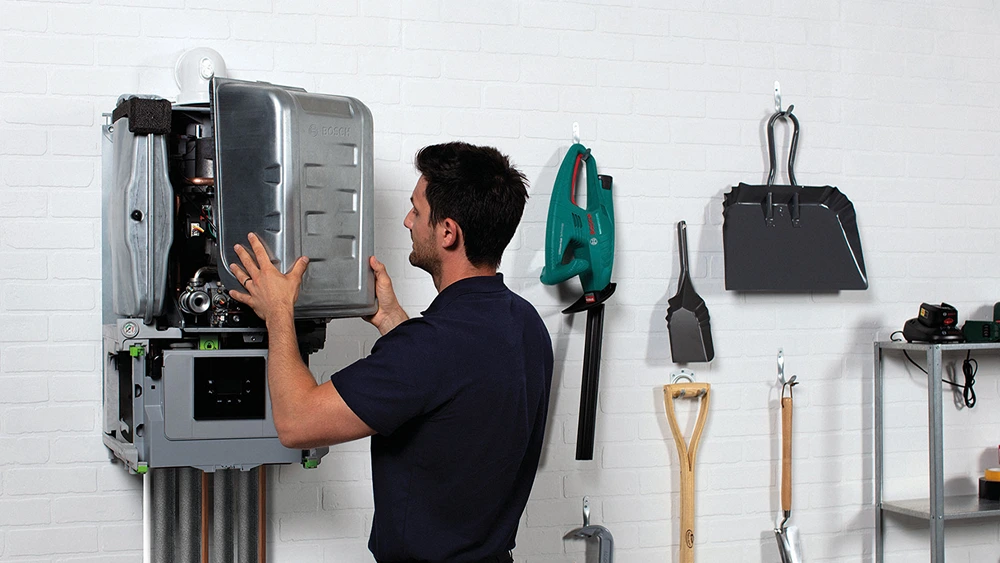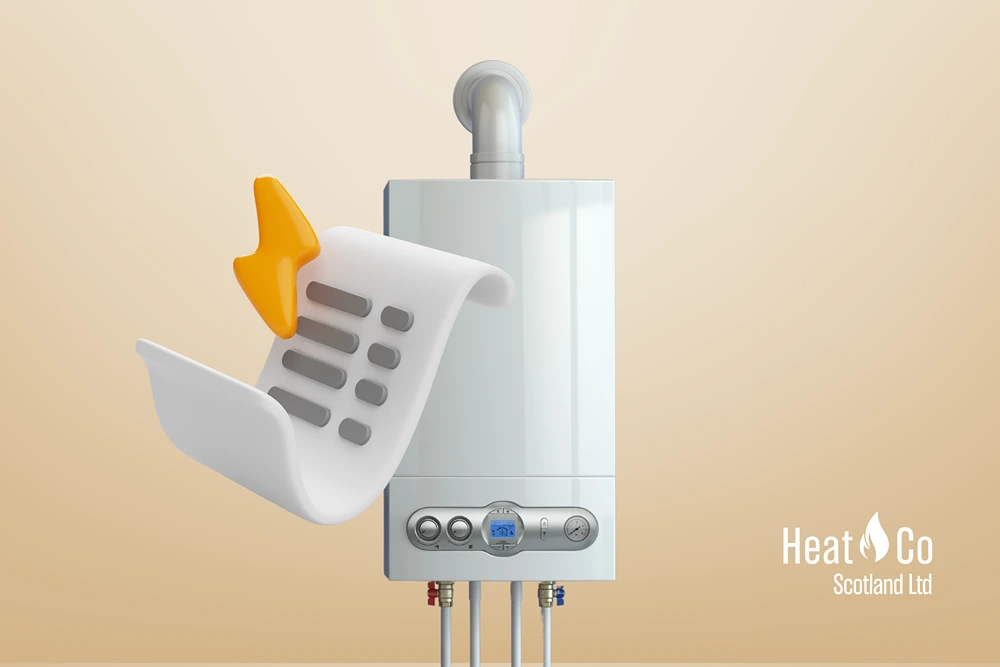Have you ever wondered how much your old boiler is costing you? The ancient boiler chugging away in your home could be burning through your hard-earned money and adding unnecessary pounds to your energy bills. By upgrading to a modern, energy-efficient boiler, you can significantly reduce your energy costs. In this article, HeatCo Scotland Ltd will explore how a new A+ grade condensing boiler can potentially save up to 30% on your energy bills, translating to an annual saving of around £580. Discover the financial benefits and technological advancements that make this upgrade a smart choice for Glasgow and central Scotland homeowners.

How Modern Boilers Improve Energy Efficiency
Modern boilers significantly improve energy efficiency by incorporating advanced technology and design features. With operation efficiencies of 90% or higher, these boilers outperform older models, which are often much less efficient. For instance, upgrading to a new A+ grade condensing boiler can save up to 30% on energy bills, translating to potential annual savings of around £580. Condensing boilers achieve this efficiency by converting more fuel into heat, thereby reducing the amount of fuel required to maintain a comfortable indoor temperature.
- Condensing Technology: Utilises wasted heat from the flue gases, enhancing overall efficiency.
- Modulating Burners: Adjusts the burner output to match the heating demand, reducing fuel consumption.
- Smart Controls: Integrates with home automation systems for optimal heating schedules and remote control.
- Weather Compensation: Adjusts boiler output based on outdoor temperatures, maintaining consistent indoor comfort.
- Load Compensation: Alters the boiler’s operation based on the current heating load, improving efficiency.
Financially, the initial investment in a high-efficiency boiler is offset by the substantial reduction in energy bills. Lower energy consumption means reduced operational costs, and the increased efficiency results in fewer breakdowns and maintenance issues. Over time, these savings make the modern boiler a cost-effective solution for homeowners.
Environmentally, modern boilers contribute to a significant reduction in carbon footprints. By using less fuel and operating more efficiently, they emit fewer greenhouse gases compared to older models. This not only benefits the individual homeowner but also contributes to broader environmental sustainability efforts.
Comparing Old vs. New Boiler Systems
Older boiler systems are notoriously inefficient, consuming more energy and emitting higher levels of greenhouse gases compared to modern alternatives. Boilers with a G efficiency rating, which are commonly found in older homes, can be up to three times less efficient than new A-rated models. This inefficiency not only results in higher energy bills but also contributes significantly to environmental pollution. Boilers should ideally be replaced after about 15 years to maintain efficiency and reduce energy costs. boiler replacement not only ensures continued energy efficiency but also introduces homeowners to the latest technological advancements in heating systems. By upgrading, you can take advantage of features like smart controls and modulating burners, which enhance comfort and reduce operational costs. Over time, the performance of older boilers deteriorates, leading to frequent breakdowns and costly repairs, further inflating the total cost of ownership.
In contrast, modern boilers offer a myriad of advantages that make them a worthwhile investment. New A-rated boilers are designed for high energy efficiency, often operating at 90% efficiency or higher. When you choose the right boiler, you ensure that your heating system meets your specific needs, balancing efficiency with performance. Selecting the appropriate model can lead to significant energy savings and improved home comfort, making it a crucial decision for any homeowner. This translates to substantial savings on energy bills, potentially cutting costs by up to 30%. Advanced features such as condensing technology, modulating burners, and smart controls enhance overall performance, ensuring consistent heating with minimal energy waste. Additionally, newer models are more environmentally friendly, emitting fewer greenhouse gases and thus reducing the household’s carbon footprint.
| Feature | Old Boilers | New Boilers |
|---|---|---|
| Efficiency Rating | G-rated (up to 70%) | A-rated (90% or higher) |
| Fuel Consumption | High | Low |
| Greenhouse Gas Emissions | High | Low |
| Maintenance Costs | High | Low |
| Lifespan | 15-20 years | 15-20 years |
Financial Savings and Long-term Benefits
Installing a new boiler is a significant investment, but the potential savings on energy bills can make it a wise financial decision. How much can you save by installing a new boiler? You can save up to £580 per year on energy bills with a modern, energy-efficient boiler. This initial investment can be recovered over time through reduced energy consumption and lower utility costs. The efficiency of new boilers means they convert more fuel into usable heat, providing consistent warmth while using less energy.
Long-term financial benefits of a new boiler extend beyond just energy savings. New boilers are designed to be more reliable, reducing the likelihood of breakdowns and the associated repair costs. With lower maintenance requirements and extended warranties, homeowners can enjoy peace of mind and fewer unexpected expenses. Additionally, the increased efficiency of new models means that they produce less wear and tear on components, further extending their lifespan and enhancing their value over time.
- Lower Energy Bills: New boilers operate at higher efficiency, significantly reducing monthly heating costs.
- Reduced Maintenance Costs: Modern boilers require less frequent servicing and are less prone to breakdowns.
- Enhanced Property Value: An energy-efficient boiler can increase the resale value of your home.
- Government Incentives: Eligibility for grants and rebates can offset the initial investment cost.
- Longer Lifespan: New boilers are built to last longer, providing extended periods of reliable service.
Overall, the financial impact of a new boiler is substantial. By lowering energy bills, reducing maintenance costs, and potentially increasing property value, the return on investment for a new boiler can be realised within a few years. The combination of immediate savings and long-term financial benefits makes upgrading to a new boiler a prudent choice for homeowners looking to improve their home’s energy efficiency and reduce overall heating costs.

Environmental Impact of Upgrading Your Boiler
Older boilers are major contributors to energy consumption and greenhouse gas emissions. Operating at lower efficiency levels, these outdated systems require more fuel to produce the same amount of heat, leading to higher energy usage and increased emissions. This inefficiency not only impacts your energy bills but also contributes significantly to environmental degradation. The continued use of older, less efficient boilers exacerbates issues related to climate change, as they emit higher levels of carbon dioxide and other harmful gases.
Modern, energy-efficient boilers, on the other hand, are designed to minimise energy consumption and reduce greenhouse gas emissions. new boilers reduce carbon footprint by operating at higher efficiency levels, which means they use less fuel and emit fewer pollutants. This not only benefits the environment but also aligns with global efforts to combat climate change, making the upgrade a responsible and impactful choice for homeowners. By converting more fuel into usable heat, these advanced systems operate at higher efficiency levels, often exceeding 90%. This results in lower fuel consumption and subsequently, a smaller carbon footprint. Upgrading to an eco-friendly boiler not only supports sustainable living but also aligns with broader environmental goals by reducing the overall demand for fossil fuels.
- Lower Emissions: Modern boilers emit fewer harmful gases, such as carbon dioxide, contributing to cleaner air.
- Reduced Energy Consumption: High-efficiency models require less fuel to produce the same amount of heat, conserving natural resources.
- Minimised Waste: Advanced technology in new boilers ensures more complete fuel combustion, reducing waste and pollutants.
- Support for Renewable Energy: Many modern boilers are compatible with renewable energy sources, further decreasing reliance on fossil fuels.
Cost-Benefit Analysis of Boiler Installation
Installing a new boiler involves several initial costs, including the price of the boiler unit itself, professional installation fees, and any necessary modifications to your existing heating system. The cost of a new boiler can range from £1,500 to £3,000, depending on the type and efficiency rating. Professional installation adds another £500 to £1,500 to the total cost. boiler installation is a critical step in ensuring that your new system operates efficiently and safely. Proper installation can significantly impact the performance and lifespan of your boiler, making it a worthwhile investment. By choosing a professional service, you ensure that all components are correctly fitted and that the system is calibrated to deliver optimal energy savings. While these upfront expenses may seem substantial, they are an investment that can lead to significant long-term savings. Proper installation is crucial, as poor installation can lead to higher energy consumption and increased costs.
Running and maintenance costs are another critical factor to consider. Older boilers often require frequent repairs and regular servicing to maintain their performance, leading to higher maintenance costs over time. New boilers, especially those with high-efficiency ratings, are designed to operate more reliably and require less frequent maintenance. This not only reduces the ongoing costs associated with boiler upkeep but also ensures more consistent and efficient heating. High-efficiency boilers also consume less fuel, which directly lowers the cost of running the boiler on a day-to-day basis.
The long-term financial benefits of installing a new boiler can be substantial. Modern boilers are generally worth the investment due to the significant savings on energy bills. High-efficiency boilers can reduce energy consumption by up to 30%, translating to annual savings of around £580. Additionally, newer models have longer lifespans and often come with extended warranties, providing peace of mind and reducing the likelihood of unexpected expenses. Over time, the initial investment in a new boiler is offset by the cumulative savings on energy bills and reduced maintenance costs, making it a financially sound decision.
| Cost Type | Old Boiler | New Boiler |
|---|---|---|
| Initial Cost | £1,000 – £2,000 | £1,500 – £3,000 |
| Installation Fees | £300 – £800 | £500 – £1,500 |
| Running Costs | High | Low |
| Maintenance Costs | High | Low |
| Lifespan | 15-20 years | 15-20 years |
Government Schemes and Incentives for New Boilers
Government schemes and grants are available to assist with the costs of a new boiler for those who qualify. These schemes include energy efficiency grants aimed at promoting the adoption of more energy-efficient appliances, such as A-rated boilers and hydrogen-ready boilers. Rebate schemes and upgrade incentives are also in place to encourage homeowners to replace old, inefficient boilers with modern, eco-friendly models.
To apply for these incentives, homeowners need to first check their eligibility, which varies based on income levels, existing heating systems, and other criteria. Applications can typically be made through government websites or authorised agencies that manage these grants. Proper documentation and proof of eligibility will be required, so it’s essential to gather all necessary paperwork before starting the application process.

Tips for Maximising Boiler Efficiency
Regular maintenance is crucial for ensuring the optimal performance and efficiency of a boiler. To maximise the lifespan of your new boiler, it is essential to adhere to a consistent maintenance schedule. This includes annual check-ups, timely repairs, and the use of quality parts and services. By doing so, you not only extend the life of your boiler but also maintain its efficiency, ensuring continued savings on energy bills. Proper servicing helps identify and rectify any issues before they escalate, ensuring that the boiler operates efficiently and safely. Neglecting maintenance can lead to a build-up of debris and sediment, which forces the boiler to work harder, increasing energy consumption and reducing its lifespan. Scheduling annual check-ups and keeping the system clean can significantly prolong the boiler’s efficiency and reduce heating costs.
Installing a smart thermostat can greatly enhance boiler efficiency by providing precise control over heating schedules. Smart thermostats, such as Hive or Nest, allow homeowners to adjust temperatures remotely and create heating schedules that match their lifestyle. These devices can learn your preferences and adjust the heating accordingly, ensuring that energy is not wasted. Additionally, setting the boiler temperature a few degrees lower can result in significant energy savings without compromising comfort.
- Regular Servicing: Schedule annual maintenance to ensure the boiler operates efficiently and safely.
- Insulation Improvements: Ensure your home is well-insulated to reduce heat loss and lower energy consumption.
- Smart Thermostats: Use devices like Hive or Nest to optimise heating schedules and reduce energy waste.
- Lower Temperature Settings: Reduce the boiler temperature by a few degrees to save energy without sacrificing comfort.
- Bleed Radiators: Regularly bleed radiators to remove trapped air and maintain efficient heating.
Final Words
In examining the impact of a new boiler on your energy bills, one realises how modern boilers drastically improve energy efficiency, offering substantial financial and environmental benefits. Comparing old and new boiler systems highlights the superior performance and cost savings of newer models. Although initial investments in boiler replacement can be high, the long-term savings and reduced energy costs make it worthwhile.
Government schemes and rebates further ease the financial burden, encouraging more homeowners to upgrade. Finally, adopting energy-saving tips and proper maintenance maximises the efficiency of these modern systems, ensuring homeowners reap the full benefits. Embracing these advancements not only cuts costs but also contributes to a sustainable future.
FAQ
Will a new boiler reduce my energy bill?
A new boiler can significantly reduce your energy bill by operating at higher efficiency rates, often 90% or above. This results in less fuel consumption and lower energy costs.
How much difference does a new boiler make?
A new boiler can make a considerable difference, reducing energy usage by up to 30%. This translates to potential savings of around £580 per year on your energy bills.
Does an old boiler use more electricity?
Yes, older boilers generally use more electricity because they are less efficient. They require more energy to produce the same amount of heat as a modern, high-efficiency model.
How efficient is a 20-year-old boiler?
A 20-year-old boiler is typically much less efficient, often operating at 60-70% efficiency compared to modern boilers which operate at 90% or higher.
New boiler cost
The cost of a new boiler can vary widely depending on the model and installation specifics. On average, expect to pay between £2,000 to £4,500, including installation.
How long should a boiler last?
A well-maintained boiler should last around 15-20 years. After this period, it is advisable to consider a replacement to ensure efficiency and safety.
Government boiler scheme
The government offers various schemes and grants to help with the cost of new boilers for eligible households. Check local resources for the most current information and application procedures.
Does a new boiler increase house price?
Yes, installing a new, energy-efficient boiler can increase your house price. Modern heating systems are often attractive to buyers looking for energy savings and reduced emissions.
Old boiler vs new boiler efficiency
New boilers are significantly more efficient than old boilers. They operate at 90% efficiency or higher, while older models may operate at 60-70% efficiency, leading to higher energy bills and emissions.
New boiler savings calculator
Using a savings calculator can help estimate how much you could save by upgrading to a new boiler. Factors include current energy costs, boiler efficiency, and energy usage patterns.


